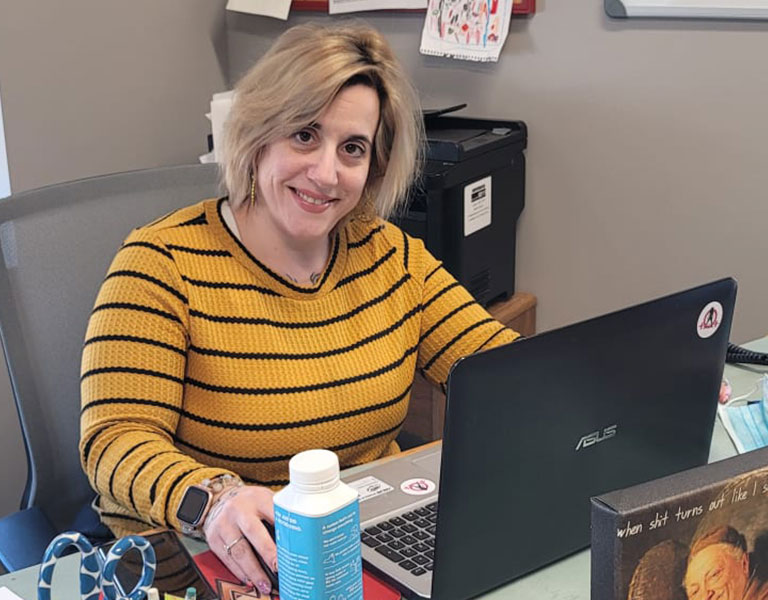How Much Is Too Much? An Interview with Dr. Nicole Labor on Alcohol and Substance Abuse

In 2021, the most common diagnosis at OneEighty for substance use disorder was alcohol dependence at 34%. While opioid use has seen a significant decline, this rate of alcohol dependence has remained consistent over the last three years. In the pandemic, substance use has increased, making people even more vulnerable to addiction. So why does alcohol dependence remain number one?
“Alcohol is the single most dangerous, addictive chemical that we have available to use,” says Dr. Nicole Labor, addiction specialist and Medical Director at OneEighty. “Even though things like heroin and fentanyl cause rapid overdose and death in young people, alcohol actually affects every single organ system. People down the road will have significant medical problems from alcohol use that you don’t see with chronic use of other substances.”
The alcohol threshold might be lower than you think
On social media, we’re bombarded with advertisements telling us that drinking alcohol is okay as long as it’s “in moderation.” But what does that mean exactly?
According to the Mayo Clinic, moderate alcohol use for healthy adults generally means up to one drink a day for women and up to two drinks a day for men. Examples of one drink include 12 fluid ounces (355 milliliters) of beer or 5 fluid ounces (148 milliliters) of wine.
Meanwhile, the NIAAA defines heavy drinking as follows:
- For men, consuming more than 4 drinks on any day or more than 14 drinks per week
- For women, consuming more than 3 drinks on any day or more than 7 drinks per week
Additionally, SAMHSA defines heavy alcohol use as binge drinking on 5 or more days in the past month.
“Be vigilant and don’t dismiss the possibility that alcohol is problematic,” Dr. Labor warns. “Don’t assume that because it’s legal and doesn’t cause immediate death that it’s safe.”
The misperceptions of alcohol addiction
“I think there’s still this kind of idea that the alcoholic looks like the guy in the trench coat with the paper bag under the bypass,” Dr. Labor says. “I think we in the treatment industry try really hard to move past that stigma. I think society as a whole doesn’t want to move past that image.”
In reality, the image of alcohol dependence looks much different: it can begin with those who work too much, or too little. In a world where productivity is prized, we are surrounded by the desire to—and often pressured to—overwork ourselves. Conversely, Dr. Labor says, “people that have no drive at all will also drink and use drugs because they don’t know what to do with themselves. They have no purpose. No purpose leads to that place of malcontent.”
Although addiction can be genetic, environmental factors can foster alcohol dependence. Dr. Labor tells us alcohol is often used as an escape from these pressures or purposelessness, and advises us to do our own self-assessment: Ask yourself, “Am I finding myself needing to counteract my actions with some chemical on a more regular basis than I was before? If I were to look back on my life in the past year, at what times did I find myself using alcohol or other chemicals more frequently?”
The solution is self-care
When we think about self-care, we often have the image of pajamas, a binge-worthy TV show, and a glass of wine. According to Dr. Labor, this isn’t what real self-care looks like. She says it’s about balance: cutting back on your working hours, paying your bills, taking some time for yourself and your family, and prioritizing.
“Let’s create a life that you don’t have to escape from,” she says. “If you remove all the chemical influences from your life, then you have no choice but to either be miserable or create a life where you’re not miserable.”
What to do if you think you have an alcohol problem
If you think you might have a problem with alcohol dependence, Dr. Labor advises this self-test:
- Pick a day on your calendar 30 days from now.
- Don’t drink any alcohol or use any other substance until that day.
- If you can’t manage to make it through 30 days without finding a reason to drink or use a substance, your first step is to seek primary care.
If you continue having substance abuse problems, you may need to seek help from addiction professionals like those at OneEighty. “We have a really broad and global understanding of what’s necessary to help you,” Dr. Labor says, but emphasizes that the key is simply knowing what alcohol and substance use resources are out there.
OneEighty Substance Abuse Resources
For those encountering a substance use crisis please call OneEighty’s Substance Use Treatment Navigator Hotline available 24 hours per day, 365 days per year at 330.466.0678. For other resources, click the links below:
Community Relations & PreventionSubstance Use Treatment Navigator Hotline
OneEighty Resources
For those encountering a substance use crisis, please call OneEighty’s Substance Use Crisis hotline, available 24 hours per day, 365 days per year, at 330-466-0678. For other resources, click the links below:
